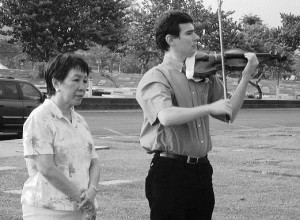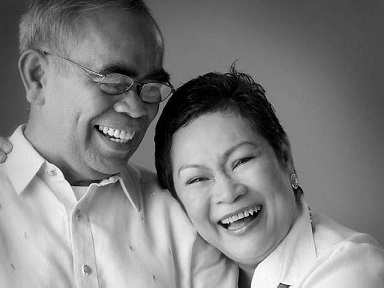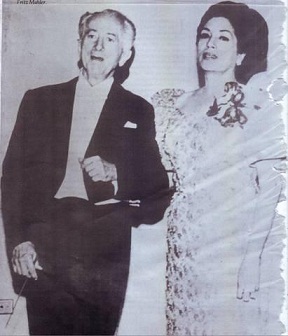By PABLO A. TARIMAN
 PEOPLE in the seven arts have a unique way of coping with death and near death situations.
PEOPLE in the seven arts have a unique way of coping with death and near death situations.
Theater buffs remember actor Jose Mari Avellana who passed away the other year and how he coped with a life-threatening scenario in the middle of a performance.
In one particular performance, Avellana was in pain and was in great danger when he finished a very moving performance of Mitch Albom’s play “Tuesdays with Morrie.”
According to director Bart Guingona’s account, Avellana vomited what looked like a bucket of blood just before curtain call. The amazing thing was, he still finished the performance even if, halfway through the poignant play, his stomach was already bleeding profusely.
When Guingona asked for a doctor in the house, everyone thought it was part of the play.
The story of Avellana’s resolve to finish a performance even if he was bleeding inside is typical, if not symbolic, of people in the arts. Like it or not, it was an act of singular heroism. It illustrates what people in the arts would go through to mount and finish a performance even at great risk to life and limb.
Six years ago, the mother of celebrated German cellist Alban Gerhardt passed away while in the middle of a grueling concert and recording commitments in Germany and England. His first instinct was to cancel, but he also remembered his mother’s admonition not to cancel no matter how urgent. And so, following his mother’s wishes, the cellist agreed to finish the concert.
Gerhardt recalled his unforgettable concert thus: “My mother lives on in my music. That’s the reason she didn’t want me to come back to Berlin even when she felt her end was approaching. She wanted me to continue playing.”
Licad had the same experience when her father, Dr. Jesus Licad, died in 2002. She had a recital at Town Hall in New York when she learned her father was dying. Then she got another urgent message: “Don’t cancel any concert.”
Doctor Licad passed away during her recital, and she rushed home just in time for the memorial service, where she played Chopin on an electric piano. That was the first time music lovers saw Cecile perform with tears falling down her cheeks.
In 2001, concertgoers thought that one performance of Romanian violinist Alexandru Tomescu at Meralco Theater was going to be canceled because they failed to see conductor Red Romero rehearse with the orchestra. What they didn’t know was, while the orchestra was rehearsing with last-minute substitute Hermie Ranera, the conductor-impresario was fighting for his life in a hospital. But he made sure he didn’t die on the night of the concert. After the standing ovation for the Tchaikovsky and Mendelssohn concertos, Maestro Romero quietly passed away. Even in his last dying moments, he made sure his death didn’t upstage the performance.
 One artist who could transcend near-death situation of any kind is filmmaker Marilou Diaz-Abaya who passed away last October 8.
One artist who could transcend near-death situation of any kind is filmmaker Marilou Diaz-Abaya who passed away last October 8.
By coincidence, her latest film “Ikaw Ang Pag-ibig,” mirrored what she went through in real life. The filmmaker herself has been through rounds of chemotherapy since her breast cancer was discovered in 2007.
After the premier night, Abaya’s faith was again put to trial with variations of the same illness that refuses to go away. The medical term is called metastasis (transfer of/ diffusion of cancer cells from its original breast site to any other organ).
Still the filmmaker’s faith didn’t waver. She confided to close friends: “With your individual and collective prayers, I am ready – physically, emotionally, and spiritually – to face this new condition. Most importantly, I feel yet another special invitation to the grace of trust in God’s plan for me which I accept totally and unconditionally.”
One of the most poignant scenes music lovers witnessed was in the wake of conductor Romero. His only daughter came for the burial minus his son Carlo who just sent a letter which landed on top of the casket near his picture. In the letter, the son wrote how much he loved his father and the poor son was sorry he could not make it to his father’s last day on earth. The letter said he would remember their happy times and never mind that his marriage to his dear Mom didn’t work.
Here you see an artist who did everything in the name of music and was suddenly alone when his time came. But his passion for music “produced” grateful “sons” one of whom was from Romania whose homecoming concerts always begin with a regular visit to the conductor’s grave. He visited the conductor’s grave before rehearsals and visited again after performance before leaving for another overseas concert.
 Like in the case of Abaya, even opera singers do have senseless bouts with sickness and death even after a colorful and fulfilling career.
Like in the case of Abaya, even opera singers do have senseless bouts with sickness and death even after a colorful and fulfilling career.
The late Gamy Viray was still teaching even as the signs of a bad complications of diabetes began to set in.
Pavarotti was planning one concert after another even as he was coping with early signs of cancer.
The career of world-acclaimed Filipina mezzo Conchita Gaston was also cut short by breast cancer. She died the way Violeta did in Traviata – by the verandah of her Amsterdam home – brave and resigned to death to the very end.
The death of dramatic soprano Remedios Bosch Jimenez was also very operatic. The initial stroke caught her in a church. She recovered but had another stroke, this time fatal, which found her fainting in another house of prayer. This was a scene straight from Tosca where the aria “Vissi d’arte, visi d’amore” (I have lived for art and love) clearly reflected her ideals as an artist. (This signature aria is probably lived to the hilt by her equally celebrated daughter, Rosemarie “Baby” Arenas.)
Until now opera lovers could not get over the senseless death of tenor Don David who was murdered along with his wife in an isolated house by a hill in Binangonan, Rizal. This is a mindless Carmen in reverse, with the Don Jose being murdered in the presence of his loved one.
Asked how she regards death, filmmaker Abaya answered by quoting a Zen saying: “The joy of raindrop is to enter the ocean.”